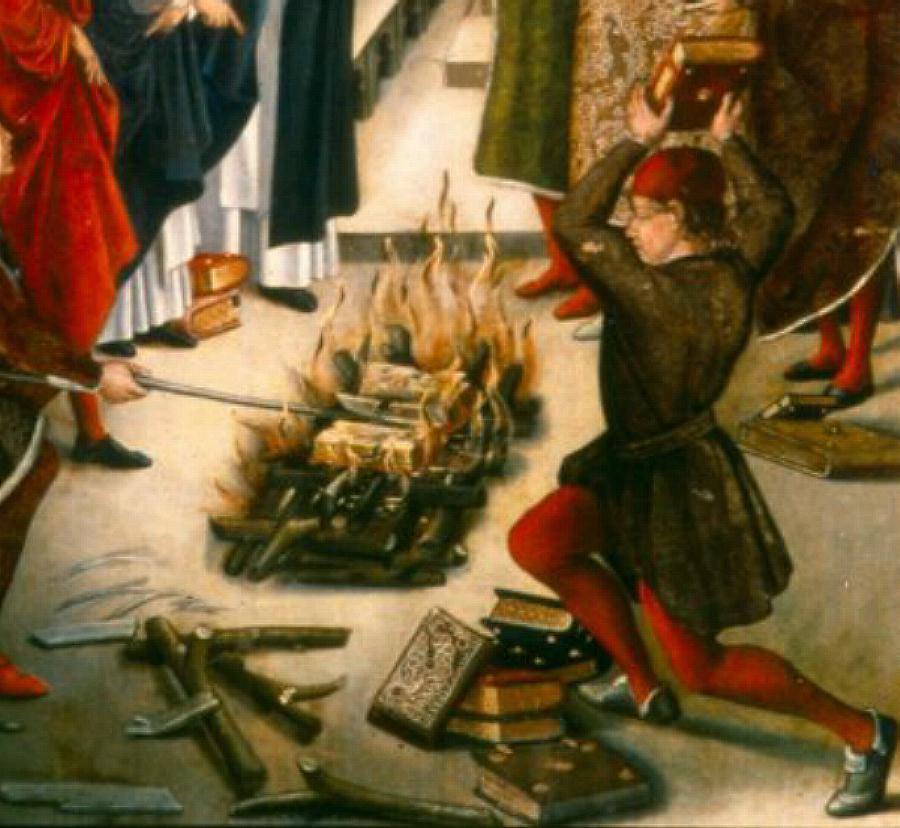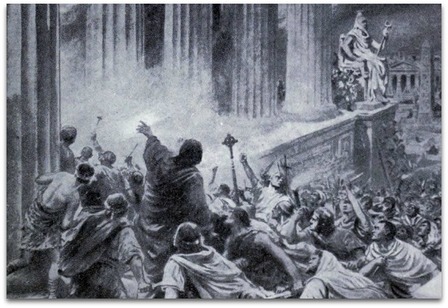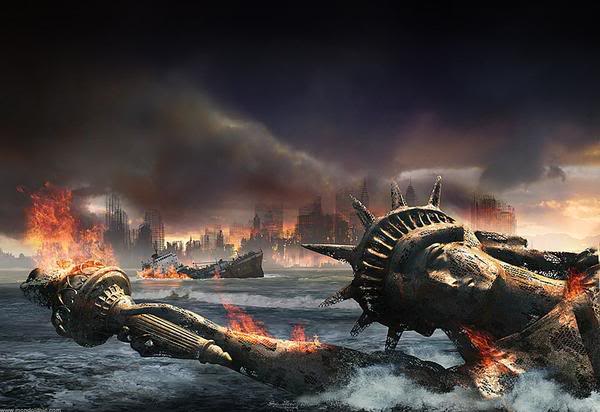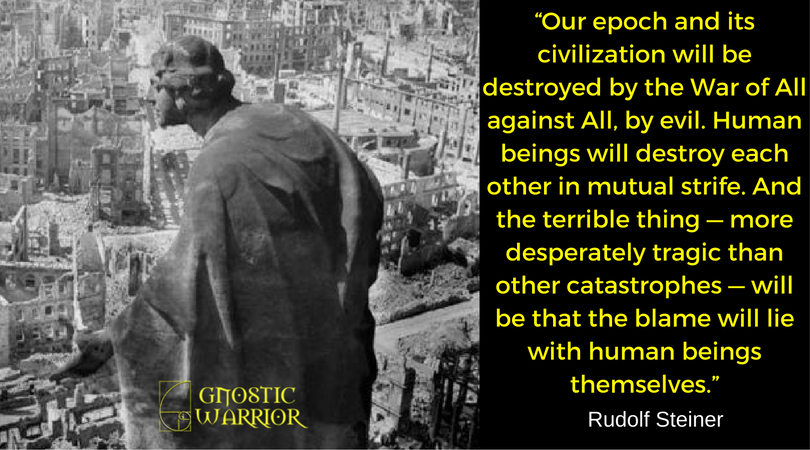By Moe Bedard and William Blades – Since man could write, books have been some of the most  prized possessions in all the world. Men would travel the globe, and spend vast fortunes in order to acquire the knowledge written on pages to fill their massive libraries.
prized possessions in all the world. Men would travel the globe, and spend vast fortunes in order to acquire the knowledge written on pages to fill their massive libraries.
Just as fast as they could build their limestone storehouses of wisdom, they were destroyed. There are many forces of nature that have caused the destruction of millions of original one of a kind books over the course of the last few thousands years. But no force has been so destructive as that of man.
Almost every race, country, religion, king and dictator has the ash of burnt books on their hands.
There are many stories over the last few thousand-years about the destruction of these libraries, and books being lost forever. There was the Library of the Serapeum in ancient Egypt that was set a blaze by the orders of Theophilus of Alexandria, who was so ordered by Theodosius I. There was the burning of the Great Library at Alexandria in 391 AD, and the Maya codices of the Yucatán were tossed to the flames by the Spanish conquistadors and Catholic monks.
The burning of the Imperial Library of Constantinople in the Byzantine Empire by the Templar Crusaders in 1204 AD. The House of Wisdom in Baghdad Iraq was destroyed in 1258 AD by the Mongol Invaders. The destruction of the United States Library of Congress in Washington, D.C. by Troops of the British Army in 1814 AD.
This list of destroyed books, and libraries can go on and on.
 THE HISTORY OF DESTROYED LIBRARIES AND BOOKS
THE HISTORY OF DESTROYED LIBRARIES AND BOOKS
One of the earliest records of the destruction of books is told to us by St. Luke, when, after the preaching of Paul, many of the Ephesians “which used curious arts brought their books together, and burned them before all men: and they counted the price of them, and found it 50,000 pieces of silver” (Acts xix, 19).
There were books and what they called little scrolls that were said to be based on gnosis, alchemy, and magic. The little scrolls had short magic sentences on them and were in high demand. They had written on them various prayers and spells as protection against such things as the “evil eye,” and evil demons.
One of the greatest ancient libraries mentioned above was built by the dynasty of the Greco- Egyptian Ptolemies who had built two in Alexandria. These ancient books of early ages were written on sheets of parchment, having a wooden roller at each end so that the reader needed only to unroll a portion at a time. The libraries were burnt to the ground on multiple occasions; once during Caesar’s Alexandrian War in 48 BC, and again in 640 AD when it was burnt by the Saracens.
Egyptian Ptolemies who had built two in Alexandria. These ancient books of early ages were written on sheets of parchment, having a wooden roller at each end so that the reader needed only to unroll a portion at a time. The libraries were burnt to the ground on multiple occasions; once during Caesar’s Alexandrian War in 48 BC, and again in 640 AD when it was burnt by the Saracens.
The great Phoenician city of antiquity, Carthage fell to the Romans in 146 B.C. during the final Punic Wars, and approximately a half a million volumes of one of a kind Phoenician books and manuscripts were burnt.
The followers of the Islamic prophet Muhammad, the Mohammedans reason for destroying books were said;”If they contain what is in the Koran they are superfluous, and if they contain anything opposed to it they are immoral.” In the 15th century the great library of the Emperor Constantine, containing 120,000 Manuscripts, and all the Christian churches were looted of their books and thrown into the sea upon the orders of Mohammed II.
At Cremona, in 1569, 12,000 books printed in Hebrew were publicly burnt as heretical, simply on account of their language; and Cardinal Ximenes, at the capture of Granada, treated 5,000 copies of the Koran in the same way.
At the time of the Reformation in England a great destruction of books took place. The antiquarian Bale, writing in 1587, thus speaks of the shameful fate of the Monastic libraries:
At the Great Fire of London in 1666, the number of books burnt was enormous. Not only in private houses and Corporate and Church libraries were priceless collections reduced to cinders, but an immense stock of books removed from Paternoster Row by the Stationers for safety was burnt to ashes in the vaults of St. Paul’s Cathedral.
Friars, an Order which was at constant war with the illiterate secular Clergy. It runs thus:—” In the year 1439, two Minorite friars who had all their lives collected books, died. In accordance with popular belief, they were at once conducted before the heavenly tribunal to hear their doom, taking with them two asses laden with books.
At Heaven’s gate the porter demanded, ‘Whence came ye?’
The Minorites replied ‘From a monastery of St. Francis.’ ‘Oh!’ said the porter, ‘then St. Francis shall be your judge.’ So that saint was summoned, and at sight of the friars and their burden demanded who they were, and why they had brought so many books with them. ‘We are Minorites,’ they humbly replied, ‘and we have brought these few books with us as a solatium in the new Jerusalem.’ ‘And you, when on earth, practised the good they teach?’ sternly demanded the saint, who read their characters at a glance.
Their faltering reply was sufficient, and the blessed saint at once passed judgment as follows:—’ Insomuch as, seduced by a foolish vanity, and against your vows of poverty, you have amassed this multitude of books and thereby and therefore have neglected the duties and broken the rules of your Order, you are now sentenced to read your books for ever and ever in the fires of Hell.’ Immediately, a roaring noise filled the air, and a flaming chasm opened in which friars, and asses and books were suddenly engulfed.”
“Their pages mangled, burnt and torn,
The loss was his alone;
But ages yet to come shall mourn
The burning of his own.”
The second poem commences with the following doggerel:—
“When Wit and Genius meet their doom
In all-devouring Flame,
They tell us of the Fate of Rome
And bid us fear the same.”
SOURCES: The Enemies of Books By William Blades

Moe is the founder of GnosticWarrior.com. He is a father, husband, author, martial arts black belt, and an expert in Gnosticism, the occult, and esotericism.

![How Earconbert, King of Kent, ordered the idols to be destroyed, and of his daughter Earcongota, and his kinswoman Ethelberg, virgins consecrated to God [640 A.D.] | Book 3 | Chapter 8 How Earconbert, King of Kent, ordered the idols to be destroyed, and of his daughter Earcongota, and his kinswoman Ethelberg, virgins consecrated to God [640 A.D.] | Book 3 | Chapter 8](https://www.gnosticwarrior.com/wp-content/plugins/contextual-related-posts/default.png)







Do you happen to have or know anything about the original works and writings of Hypatia of Alexandria and Manetho ( the Egyptian priest and historian ).
I welcome any info you might have and any links to the details about them and their work.
Thank you graciously in advance.
Cordially,
Irina Lapshina.MS>KL
Hello Irina – None of her great work or books have survived the ravages of time and man. However, there are old books written about here and her work that you could check out such as:
Hypatia: Or, the History of a Most Beautiful, Most Virtuous, Most Learned, and Everywhere Accomplished Lady By John Toland
https://books.google.com/books?id=enhbAAAAQAAJ&printsec=frontcover&dq=Hypatia+of+Alexandria&hl=en&sa=X&ved=0ahUKEwjsrL3C-aHJAhUS0WMKHQt8AuQQ6AEIHTAA#v=onepage&q=Hypatia%20of%20Alexandria&f=false
Hypatia: or, the History of a Lady, who was torn to pieces by the Clergy of Alexandria By Hypatia, John Toland
https://books.google.com/books?id=WqlWAAAAcAAJ&pg=PA18&dq=Hypatia+of+Alexandria&hl=en&sa=X&ved=0ahUKEwjsrL3C-aHJAhUS0WMKHQt8AuQQ6AEILzAD#v=onepage&q=Hypatia%20of%20Alexandria&f=false
There are not many books on Manetho in English, but in Latin:
Manethonis Apotelesmaticorum qui feruntur libri VI. By Manetho, Dorotheus (of Sidon.), Annubio, Hermann August Theodor Köchly
https://books.google.com/books?id=n0GIqrHWImcC&printsec=frontcover&dq=Manetho&hl=en&sa=X&ved=0ahUKEwj6qb6F-6HJAhUJ62MKHZw8AeM4ChDoAQhqMAk#v=onepage&q=Manetho&f=false
Hello all , I have read the alexandra book burning was indeed what we now call false flag to fool the sheeple.the books, including some of the emerald tablets of Thoth are believed , by some , to be in Rome among other places.